|
Home » Audio » Pro Sound » Hornsub shootout
| Re: Hornsub shootout RESULTS - 12π [message #28079 is a reply to message #28078] |
Sat, 15 October 2005 13:20   |
 |
 Wayne Parham
Wayne Parham
Messages: 18985
Registered: January 2001
|
Illuminati (33rd Degree) |
|
|
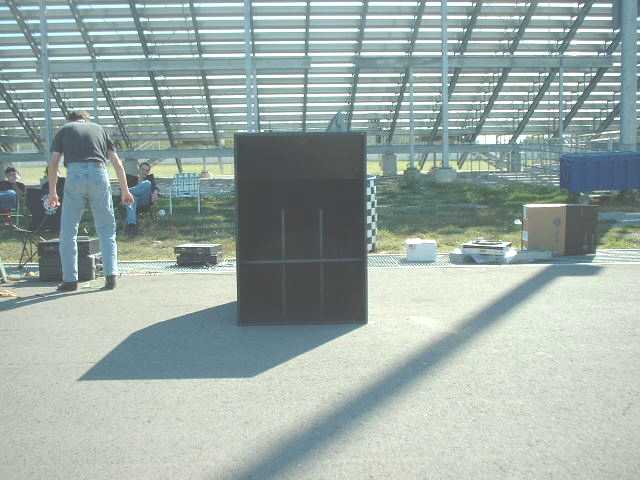 12π basshorn sub
12π basshorn sub
The 12π basshorn sub was next. It weighs in at about 230 lbs and measures 45" x 45" x 28". It uses a pair of LAB12 drivers connected in a push-pull configuration with a heat exchanger for each motor.
Specifications:
Weight: 230 lbs
Dimensions: 45" x 45" x 28"
Power handling: 1600wrms
Impedance: 4Ω
Frequency range: 30Hz - 170Hz
Sensitivity: 105dB/W/M
Max Output: 137dB/M
Distortion at 100 watts: <1%
First, we measured impedance and found Zmin to be 2.7Ω. So 16.5v is required for 100 watts, 23.2v for 200 watts, 32.8v for 400 watts, 46.5v for 800 watts and 65.7v for 1600 watts.
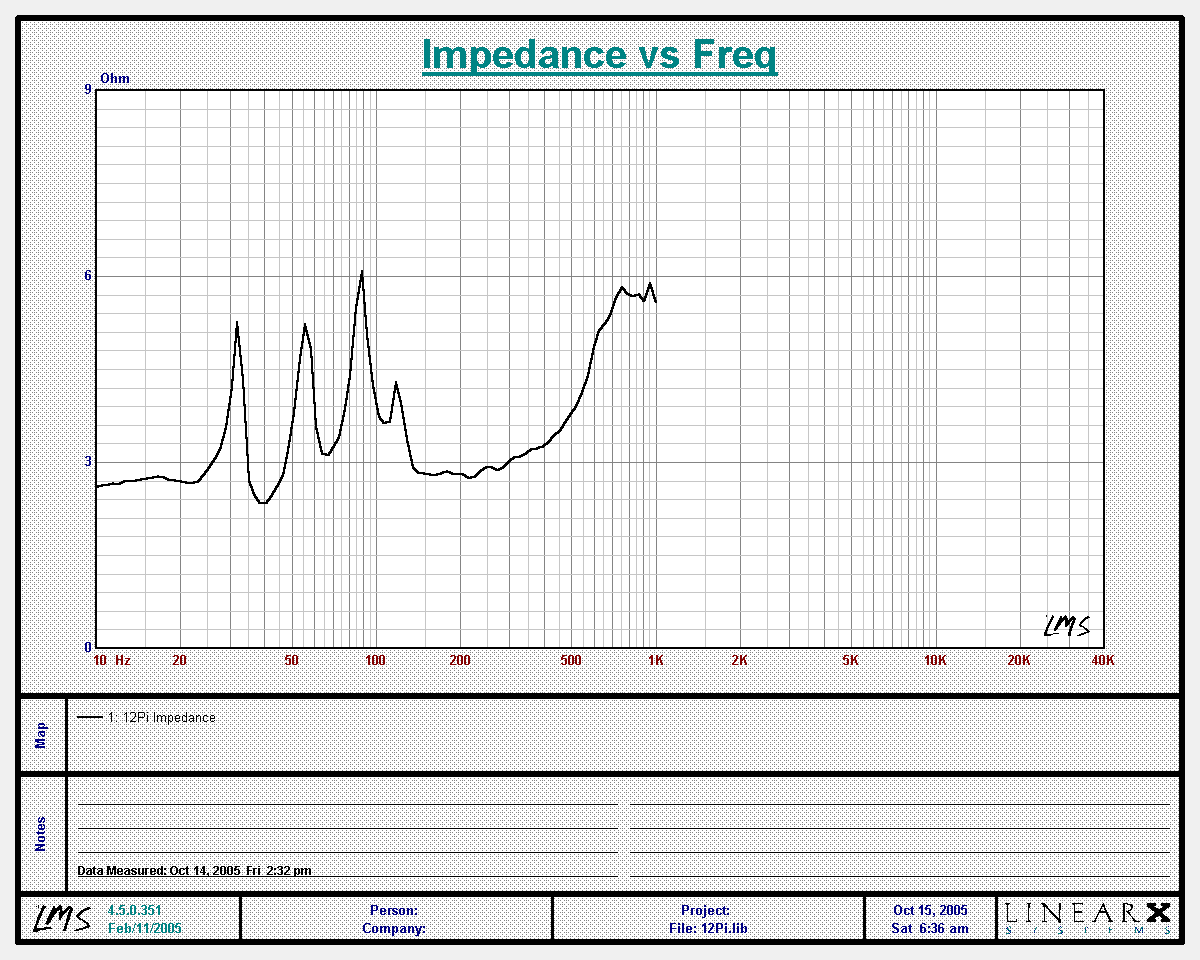 12π impedance
12π impedance
Next, we measured output at 28.28v. Since we measured 10 meters away, the values correspond to 2.83v/1M.
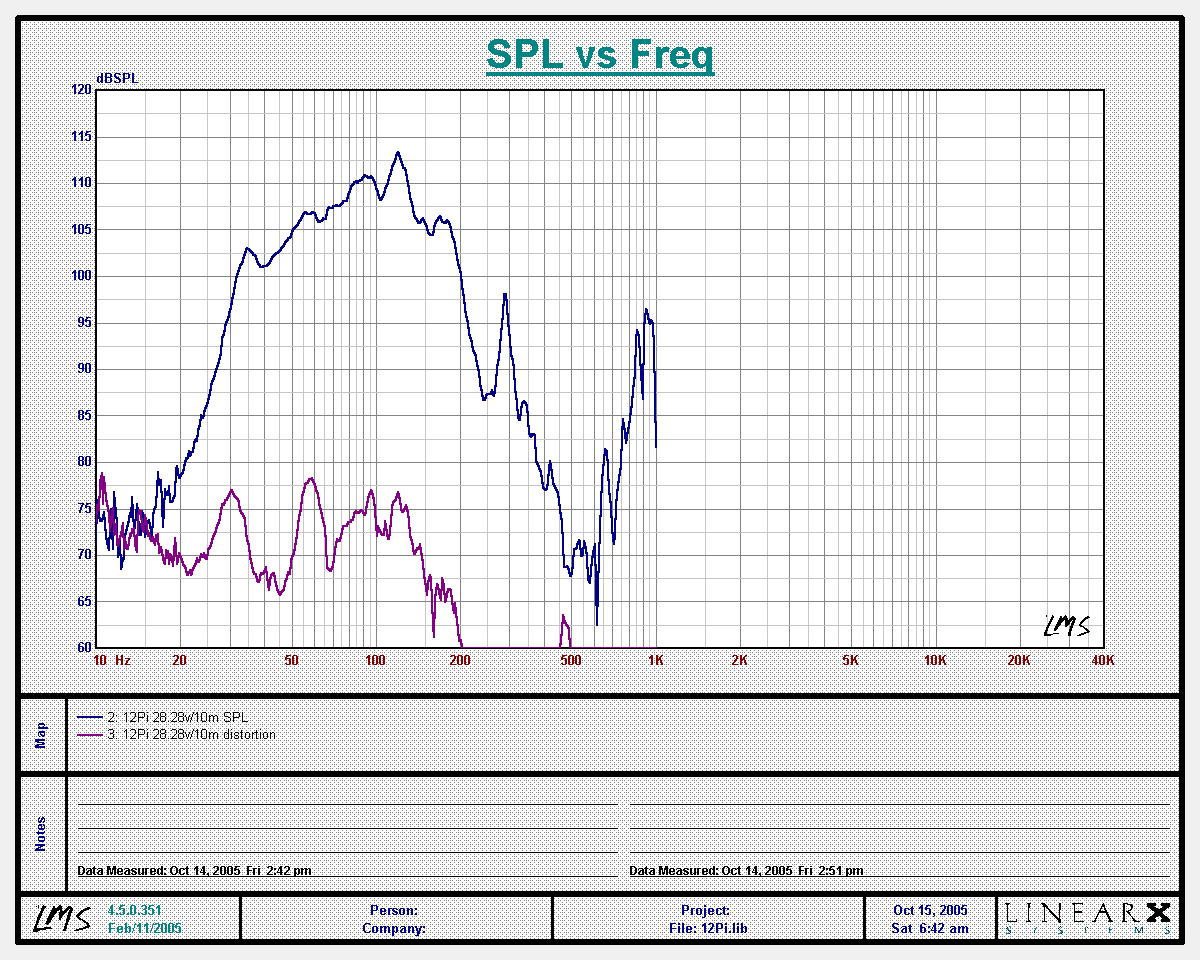 12π response at 10 meters with 28.28v input (2.83v/1M)
12π response at 10 meters with 28.28v input (2.83v/1M)
From this, we perform an inverse FFT to obtain impulse and step response:
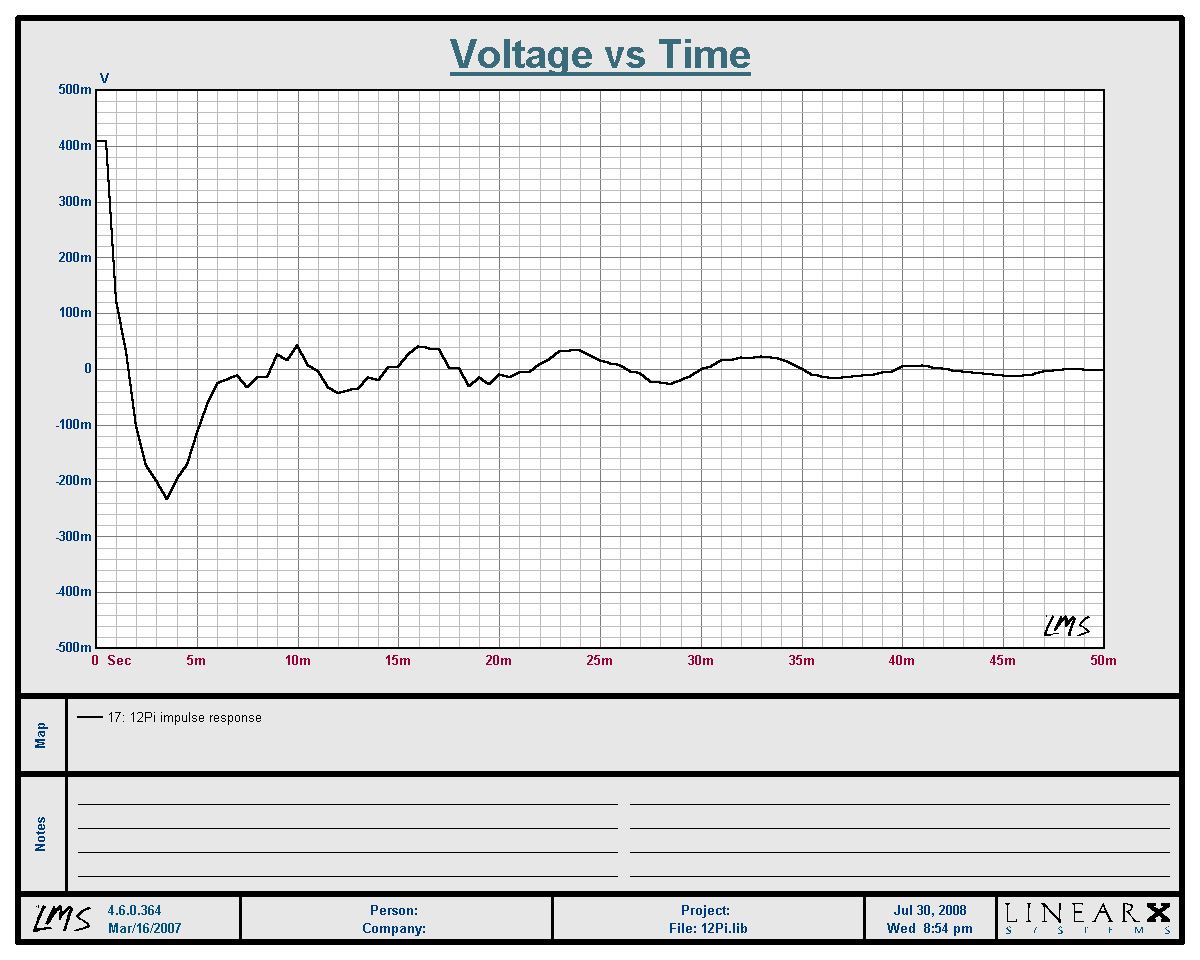 12π Impulse Response
12π Impulse Response
Now to measure output at 100 watts. Since we measured 10 meters away, the values correspond to 1W/1M.
Measurement at 100 watts:
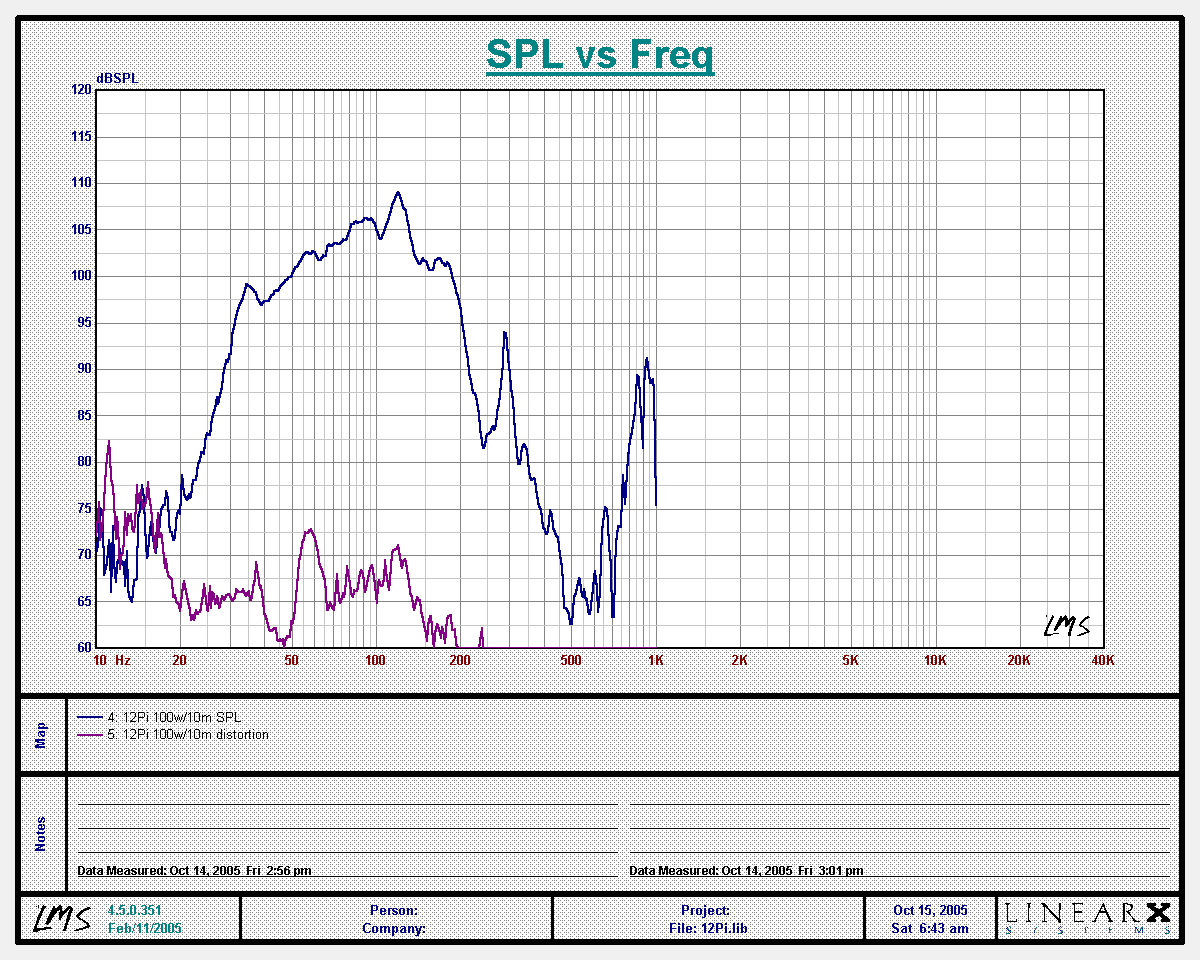 12π response at 10 meters with 16.5v (100w) input
12π response at 10 meters with 16.5v (100w) input
Output at 100 watts measured at 10 meters is about 106dB average between 60Hz and 160Hz, which is 126db at 1 meter. The blue line is SPL, and the violet line shows distortion. Average distortion is 40dB under the fundamental, which is about 1%.
Measurement at 200 watts:
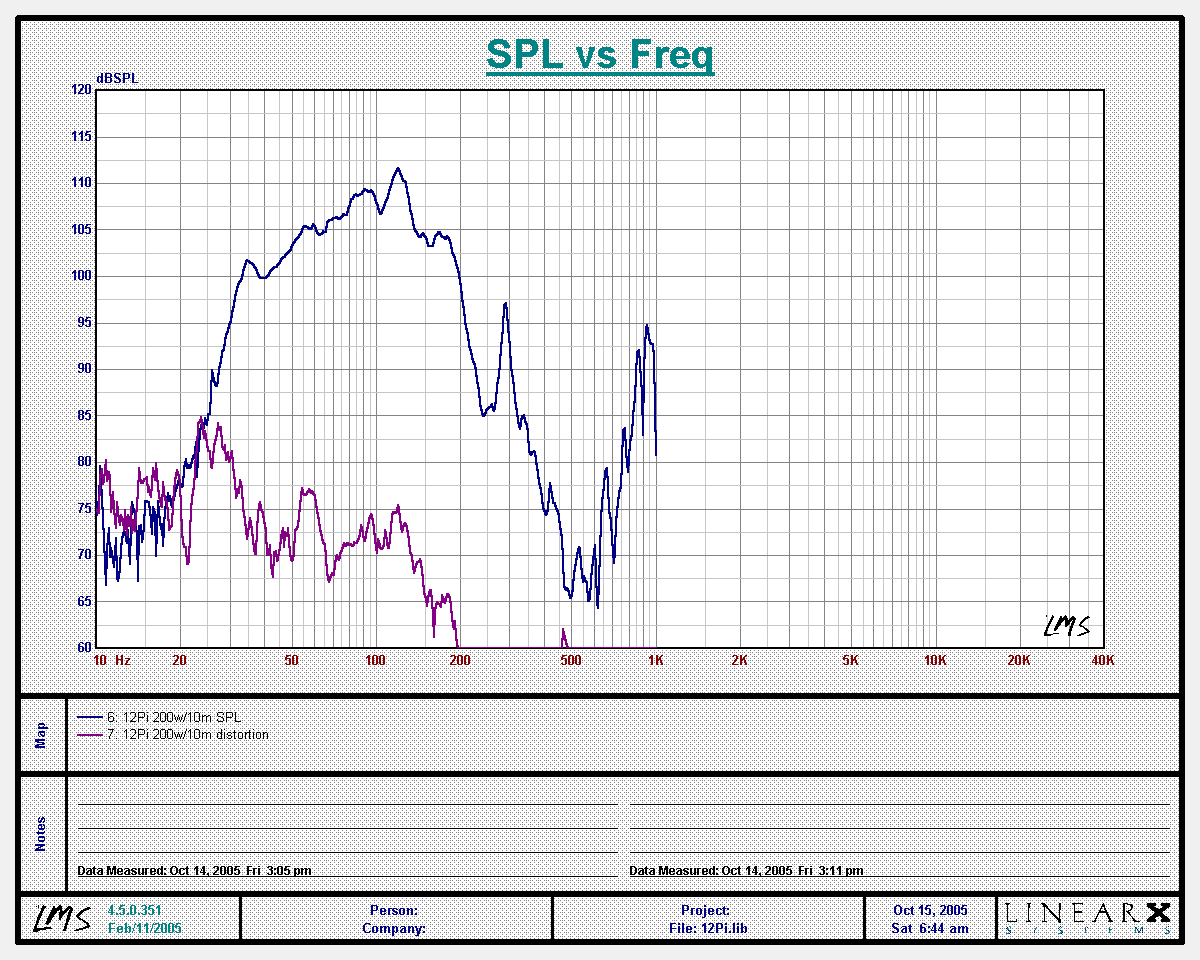 12π response at 10 meters with 23.2v (200w) input
12π response at 10 meters with 23.2v (200w) input
Output at 200 watts measured at 10 meters is about 109dB average between 60Hz and 160Hz, which is 129db at 1 meter.
Measurement at 400 watts:
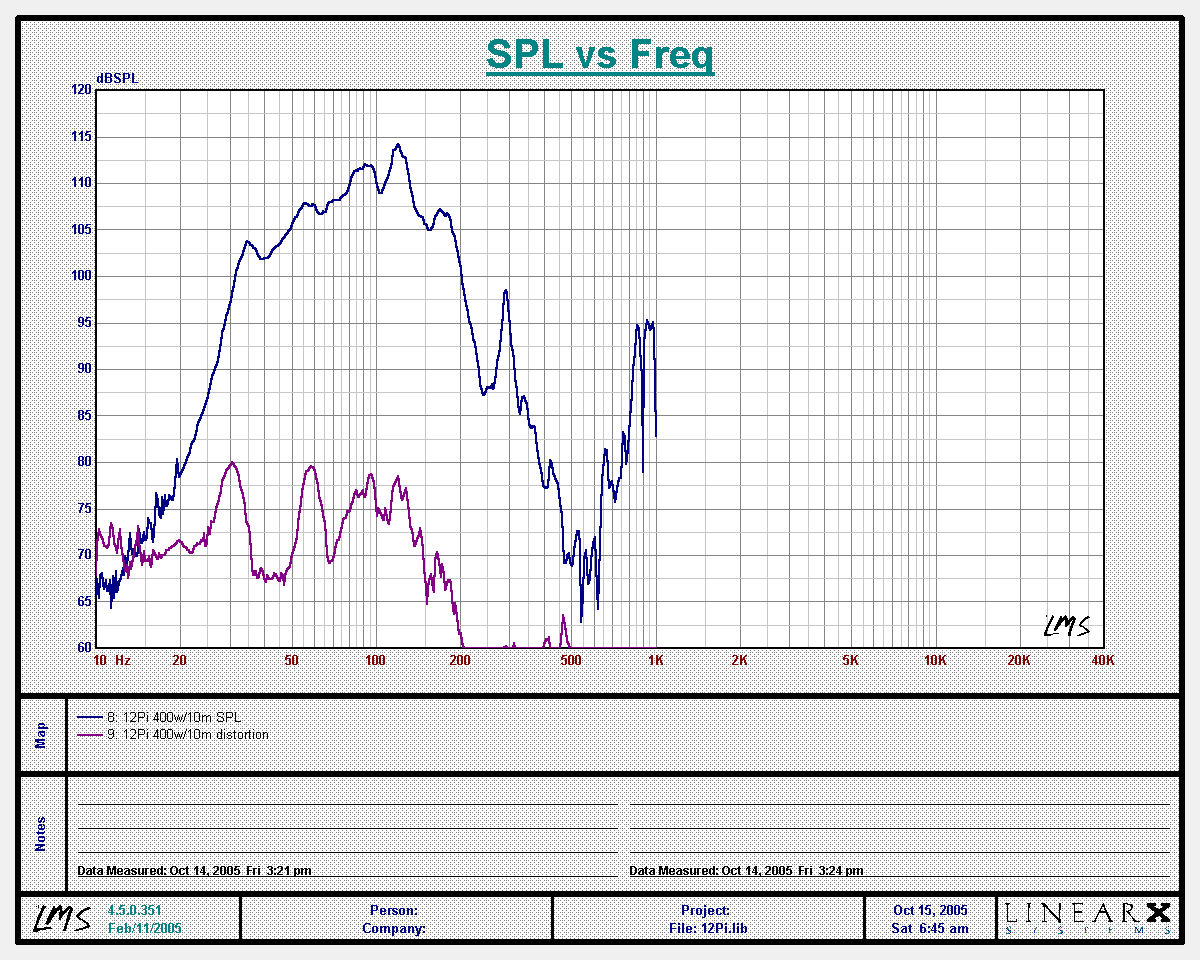 12π response at 10 meters with 32.8v (400w) input
12π response at 10 meters with 32.8v (400w) input
Output at 400 watts measured at 10 meters is about 112dB average between 60Hz and 160Hz, which is 132db at 1 meter.
Measurement at 800 watts:
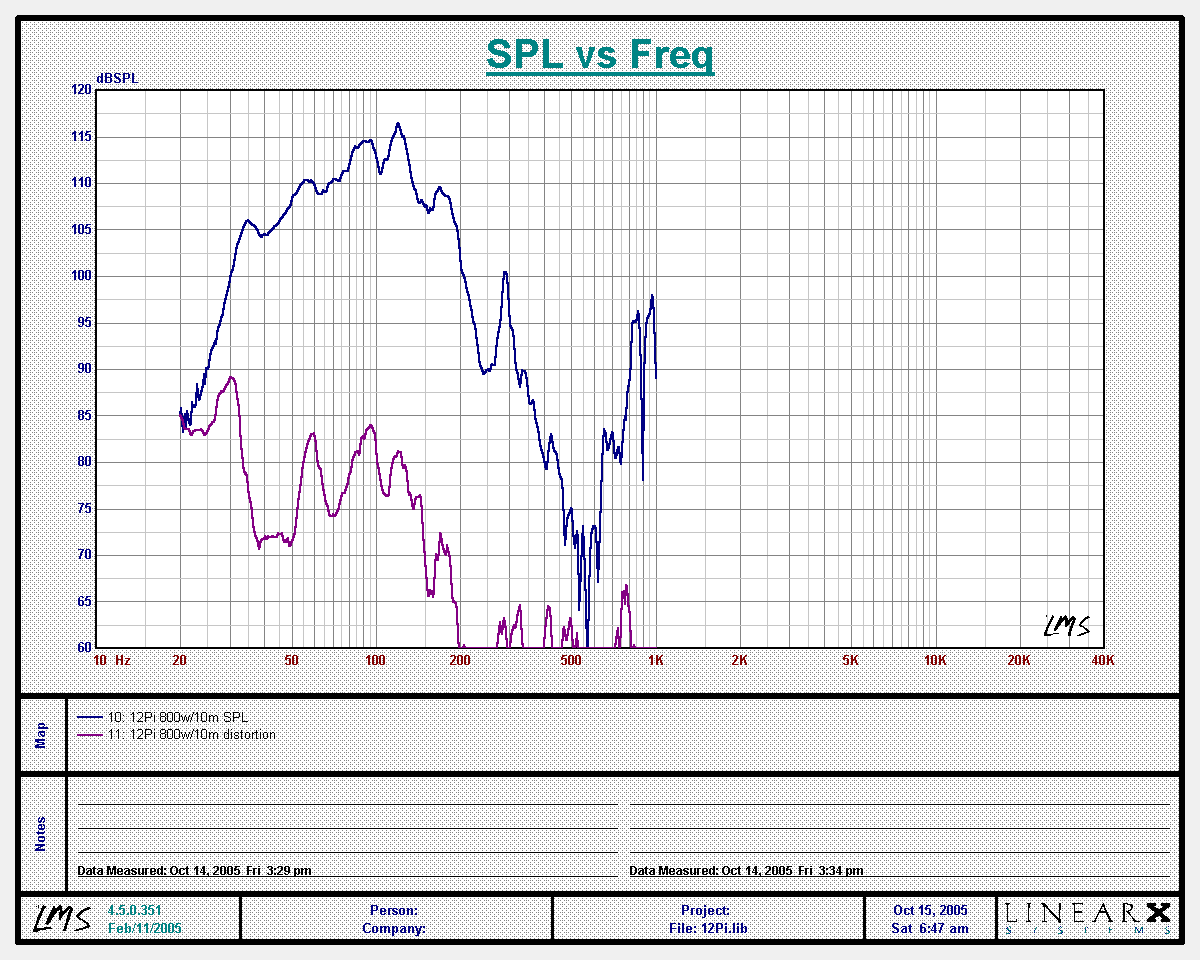 12π response at 10 meters with 46.5v (800w) input
12π response at 10 meters with 46.5v (800w) input
Output at 800 watts measured at 10 meters is about 115dB average between 60Hz and 160Hz, which is 135db at 1 meter.
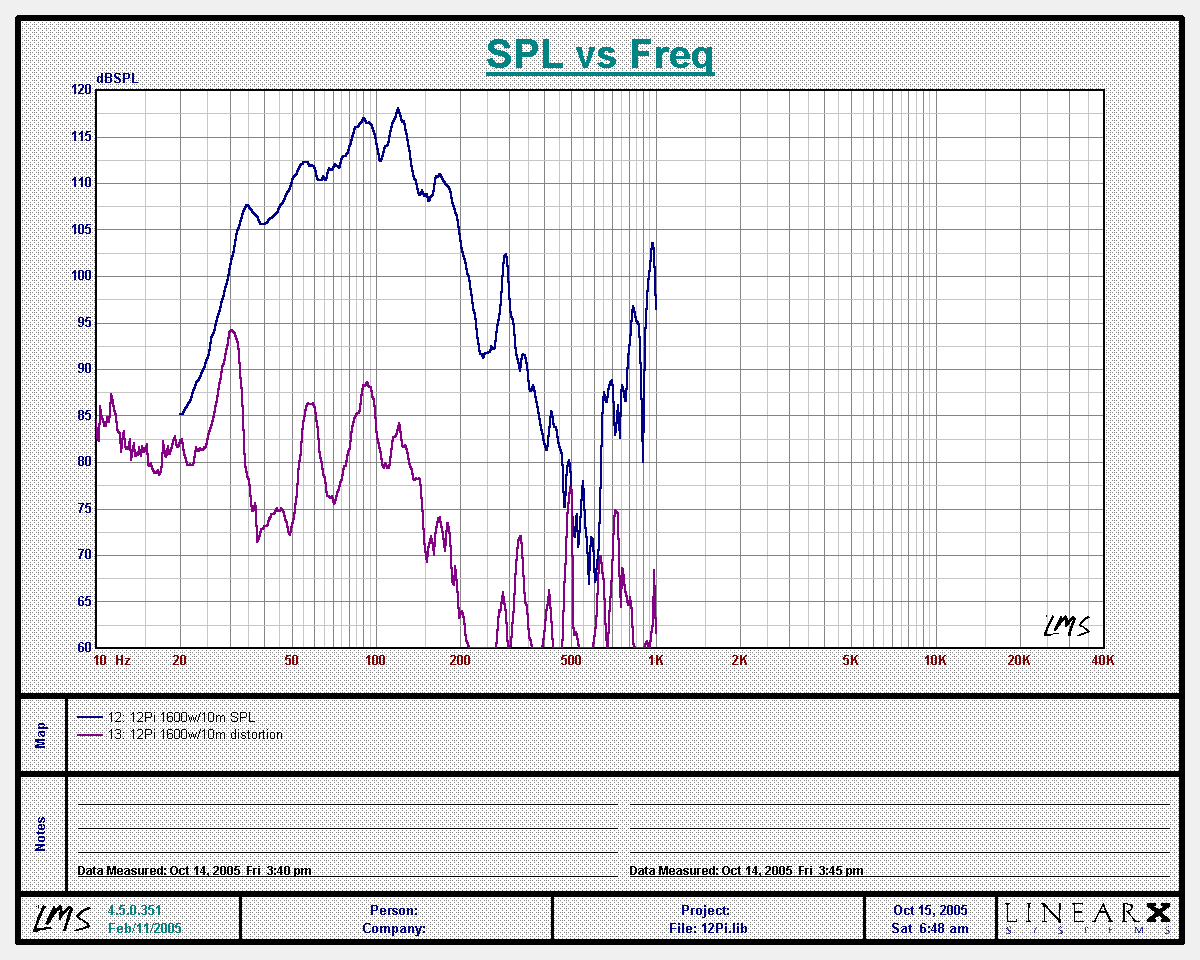 12π response at 10 meters with 65.7v (1600w) input
12π response at 10 meters with 65.7v (1600w) input
Output at 1600 watts measured at 10 meters is about 117dB average between 60Hz and 160Hz, which is 137db at 1 meter.
You can see that compression has started to set in because the increase from 800 watts to 1600 watts was not 3dB, only 2dB. It has a peak at 120Hz, so maximum continuous output is 138dB/M at that frequency. But the point is that there is nothing more to be gained from increasing power above 1600 watts.
Notice that the distortion sweep was run from 10Hz. Even at 1600 watts, mechanical excursion is not excessive at 10Hz. There was no sign of mechanical interference or stress, and the distortion levels are quite low.
This is the limit of the loudspeaker, but I wanted to go further to see how it would act. Specifically, I wanted to see if a mechanical limit was reached before thermal failure. So I ran a test at 2000 watts.
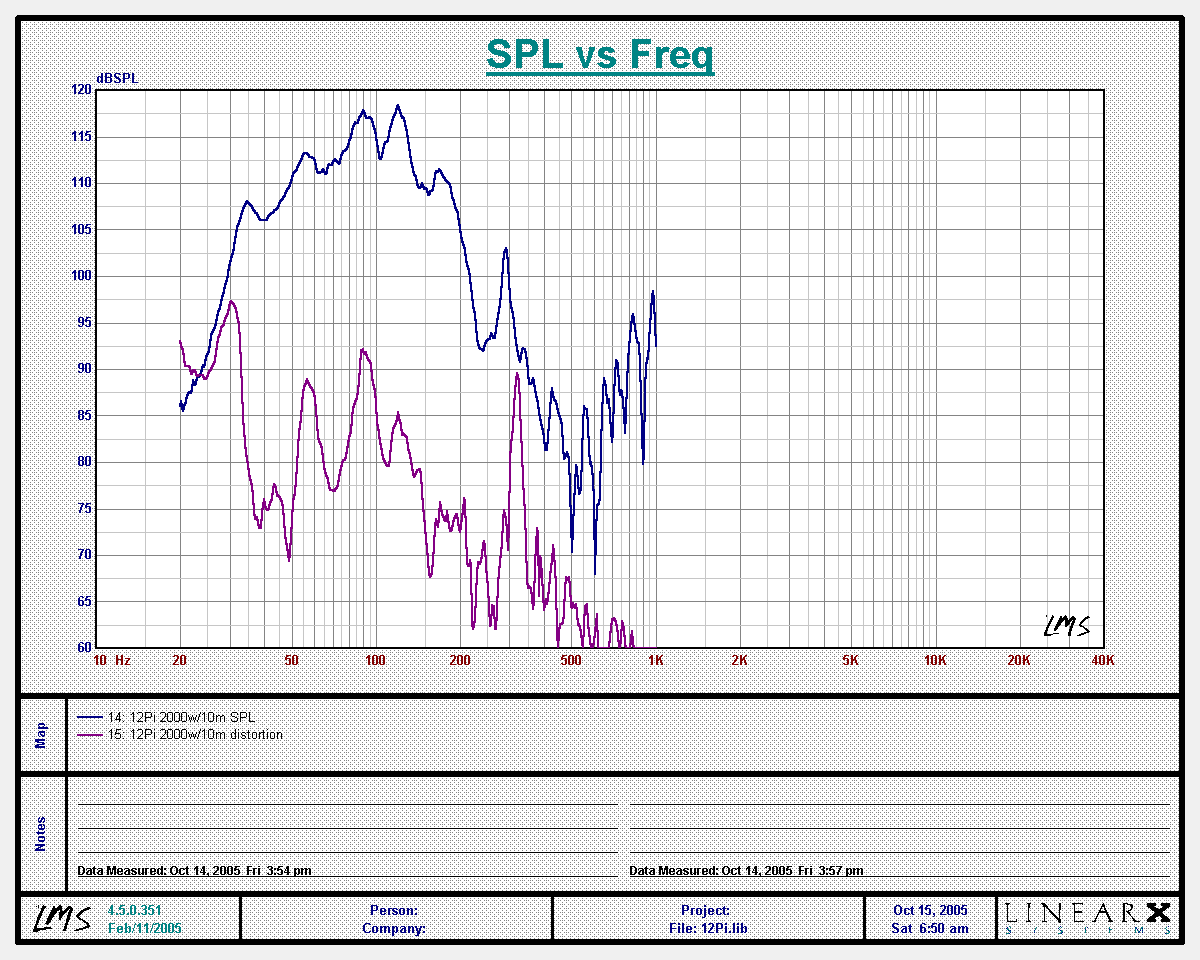 12π response at 10 meters with 73.5v (2000w) input
12π response at 10 meters with 73.5v (2000w) input
Output at 2000 watts measured at 10 meters is about 118dB average between 60Hz and 160Hz, which is 138db at 1 meter. There has been almost no increase in output with the added power. Of course, the increase in power was less than 2dB, but you can see that the increase in sound output was less than that. The power level was well in excess of the speaker's thermal limits but had not exceeded its mechanical limits. It actually sounded powerful and strong, even at this extreme level. Distortion is still quite low. So I tried it at 2400 watts.
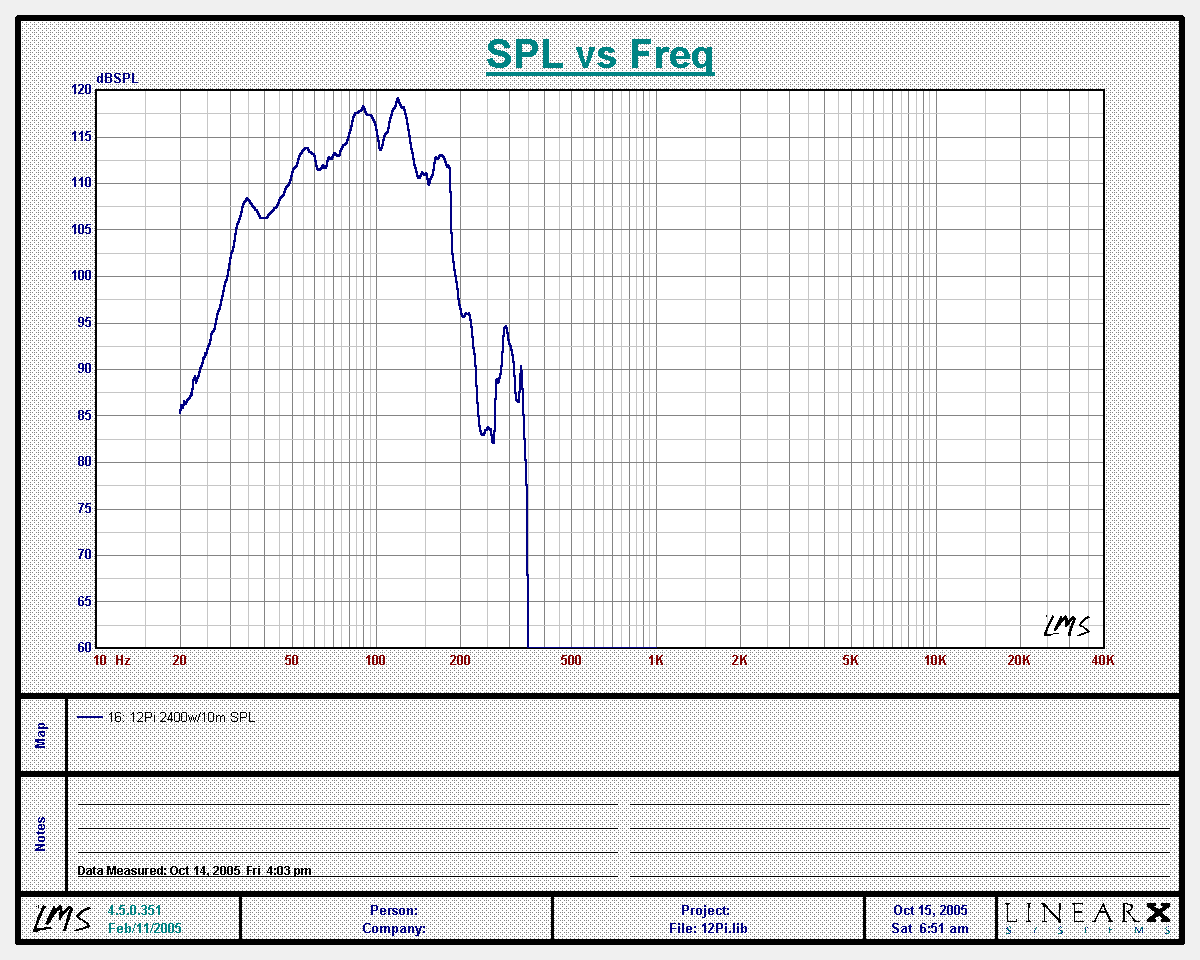 12π response at 10 meters with 80.5v (2400w) input
12π response at 10 meters with 80.5v (2400w) input
Output at 2400 watts measured at 10 meters is about 117dB average between 60Hz and 160Hz, which is 137db at 1 meter. The response curve looks good, but this is so far above the power limits of the driver that the voice coil fused near the end of the sweep. It did not exceed its mechanical limits at any frequency above 20Hz.
|
|
|
|
| Re: Hornsub shootout RESULTS - Bassmaxx Z5 [message #28080 is a reply to message #28078] |
Sat, 15 October 2005 13:20   |
 |
 Wayne Parham
Wayne Parham
Messages: 18985
Registered: January 2001
|
Illuminati (33rd Degree) |
|
|
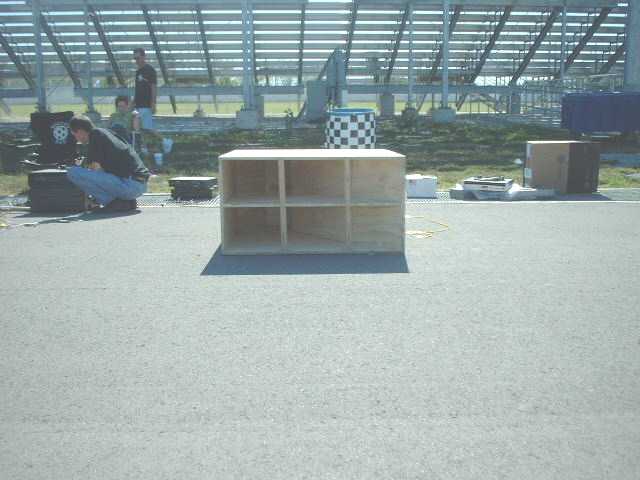 Bassmaxx Z5 basshorn sub
Bassmaxx Z5 basshorn sub
The Bassmaxx Z5 was next in line. It weighs in at about 180 lbs and measures 42" x 42" x 22.5". It uses a single 18" Merlin driver.
Specifications:
Weight: 180 lbs
Dimensions: 42" x 42" x 22.5"
Power handling: 1200wrms
Impedance: 8Ω
Frequency range: 30Hz - 170Hz
Sensitivity: 105dB/W/M
Max Output: 133dB/M
Distortion at 100 watts: 2%
First, we measured impedance and found Zmin to be 8.0Ω. So 28.28v is required for 100 watts, 40v for 200 watts, 56.56v for 400 watts, 80v for 800 watts and 98v for 1200 watts. We joked that max power is just about right to run your home. Just plug these things into the wall socket.
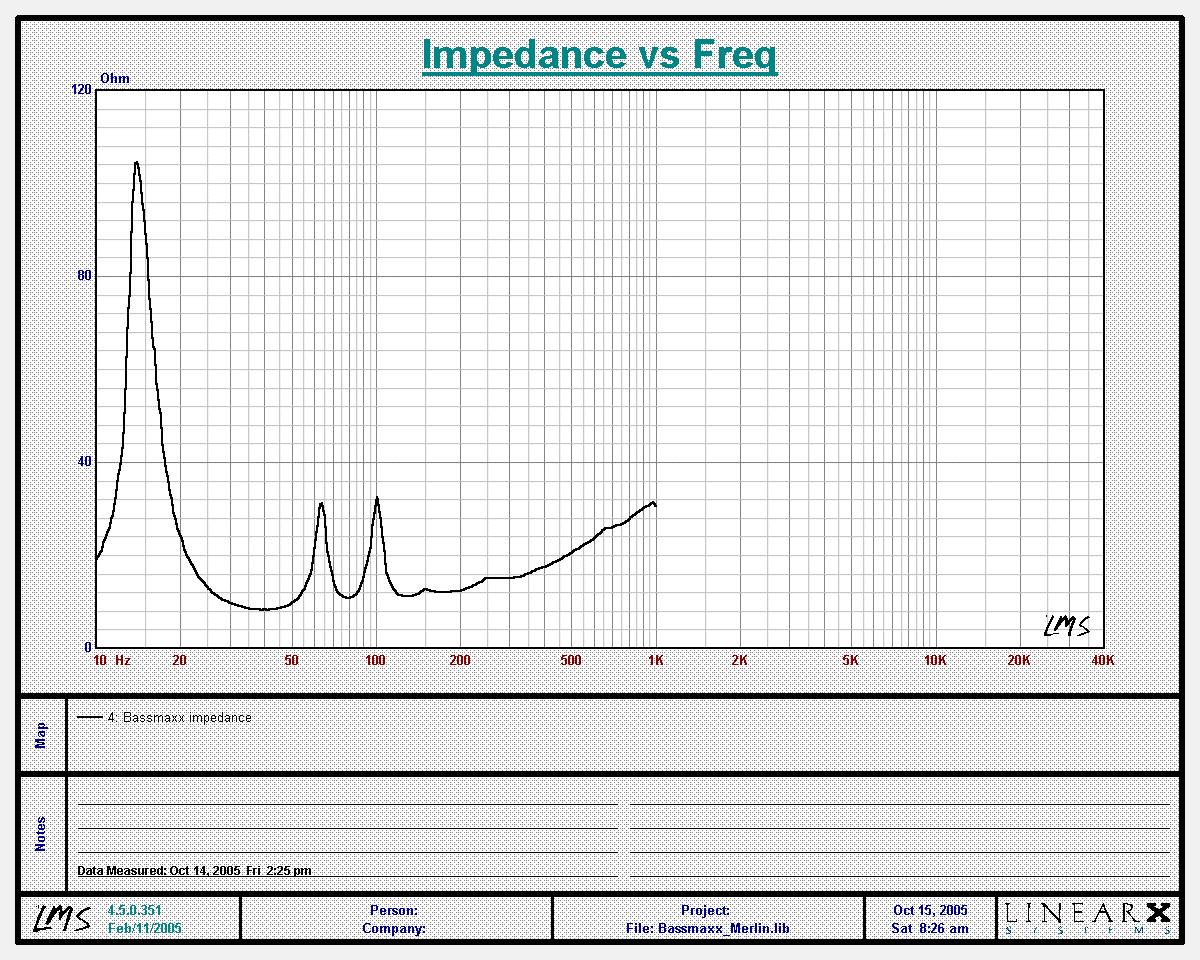 Bassmaxx impedance
Bassmaxx impedance
Next, we measured output at 28.28v. This generates 100 watts. Since we measured 10 meters away, the values correspond to both 2.83v/1M and 1W/1M.
The blue line is SPL, and the violet line shows distortion. Average distortion is 35dB under the fundamental, which is about 2%. Since measurement was taken at 10 meters, add 20dB to find SPL at 1 meter. With 100 watts input, the 10 meter measurement works out the same as 1 watt input measured at a distance of 1 meter.
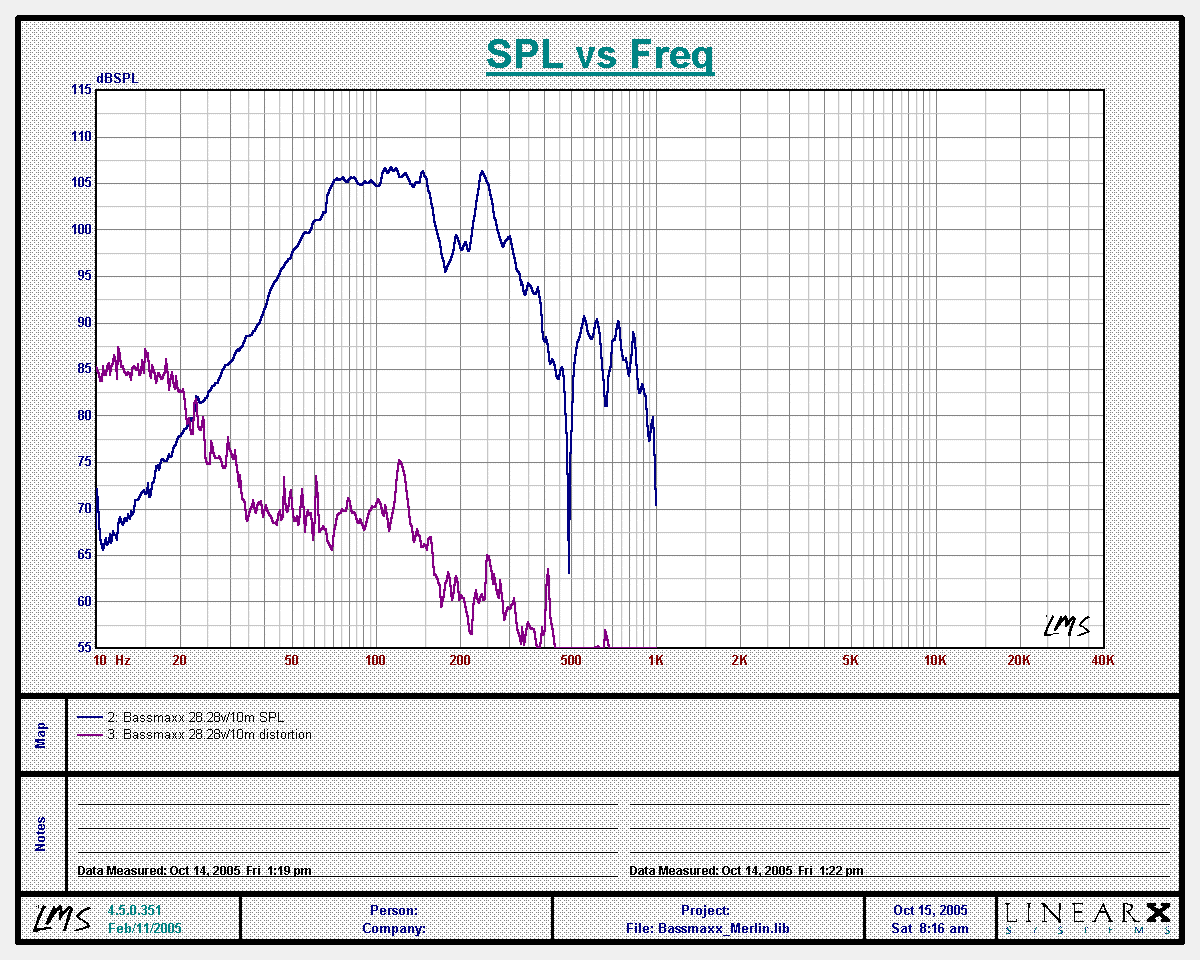 Bassmaxx response at 10 meters with 28.28v input (2.83v/1M)
Bassmaxx response at 10 meters with 28.28v input (2.83v/1M)
From this, we perform an inverse FFT to obtain impulse and step response:
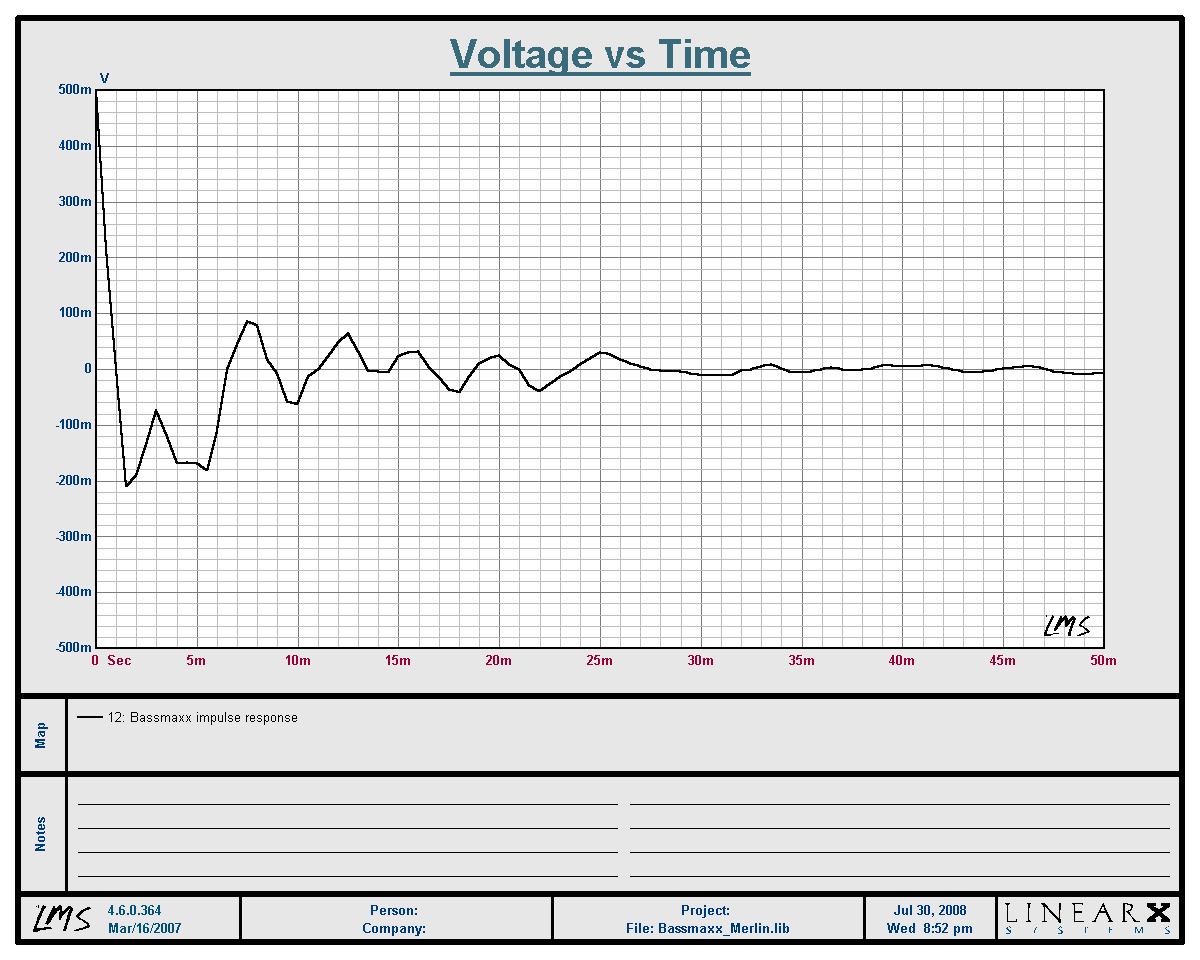 Bassmaxx Impulse Response
Bassmaxx Impulse Response
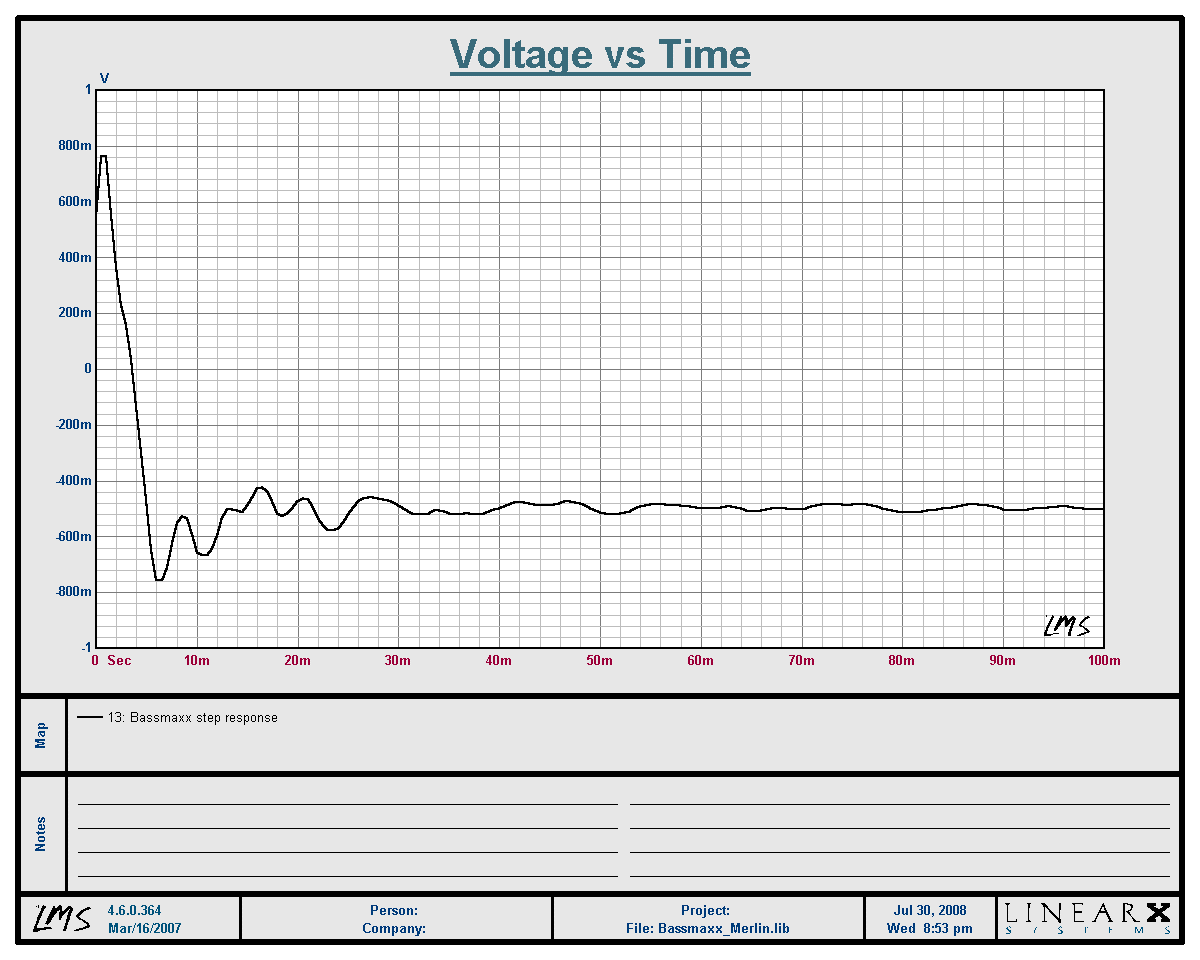
[/b]Bassmaxx Step Response[/b]
Measurement at 200 watts:
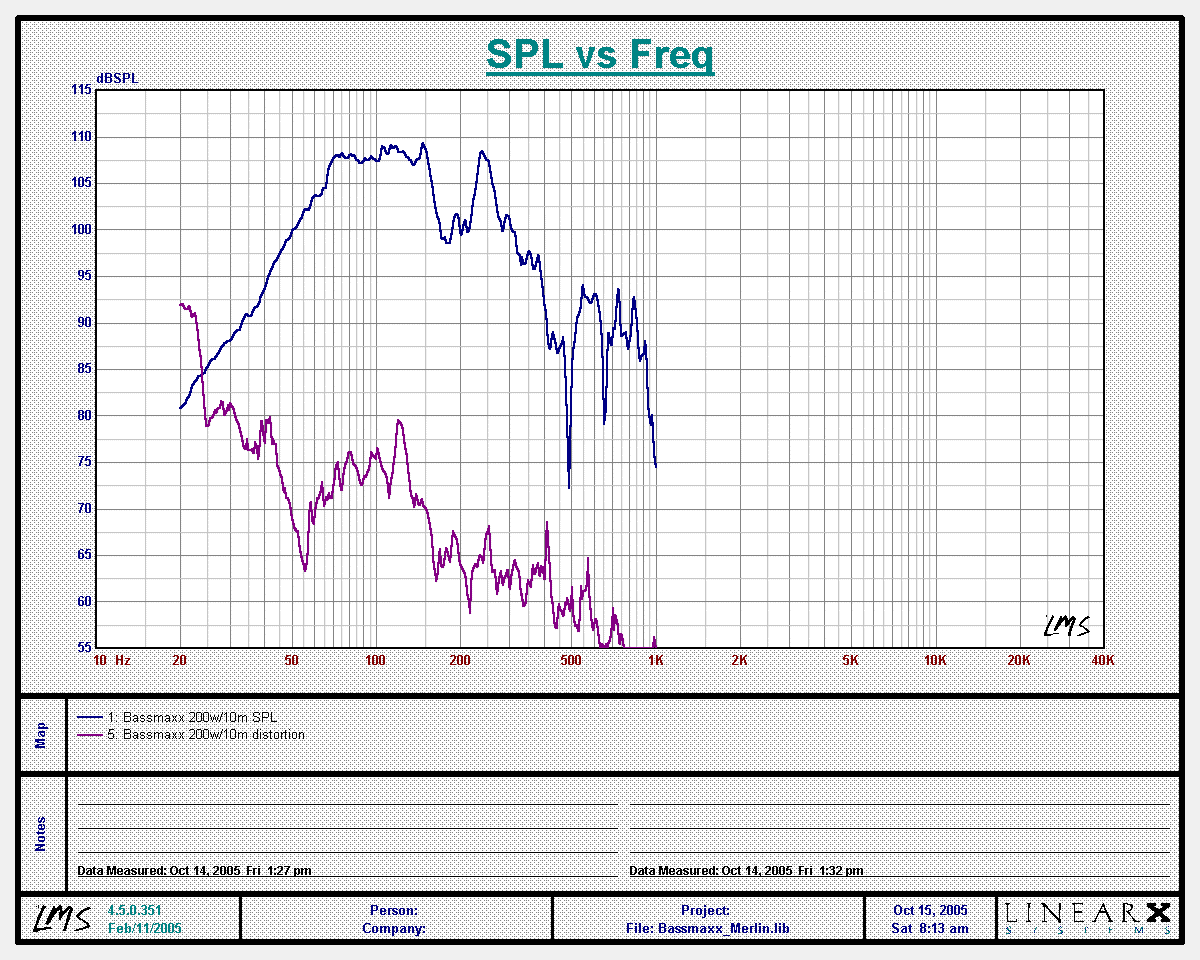 Bassmaxx response at 10 meters with 40v (200w) input
Bassmaxx response at 10 meters with 40v (200w) input
Output at 200 watts measured at 10 meters is about 108dB average between 70Hz and 150Hz, which is 128db at 1 meter.
Measurement at 400 watts:
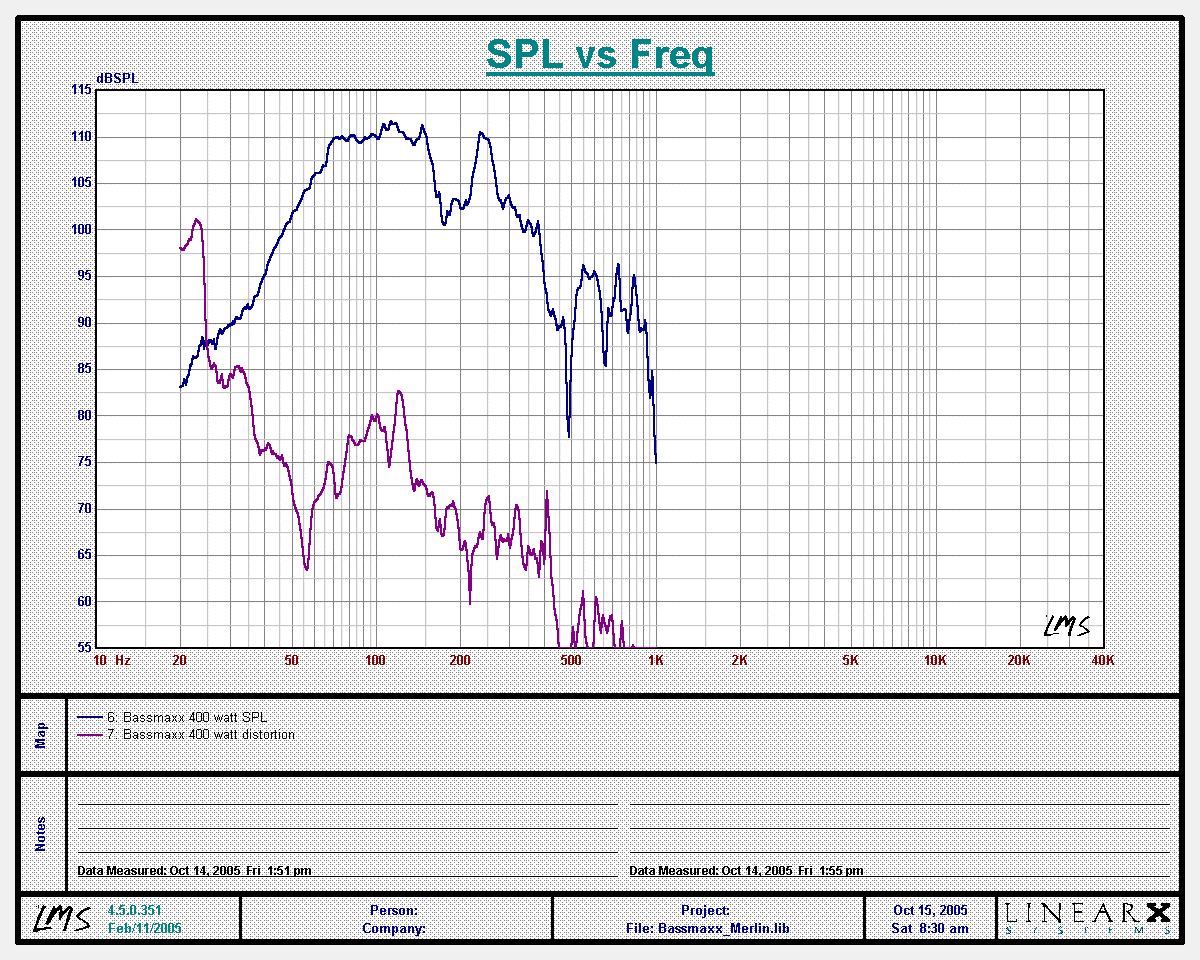 Bassmaxx response at 10 meters with 56.56v (400w) input
Bassmaxx response at 10 meters with 56.56v (400w) input
Output at 400 watts measured at 10 meters is about 110dB average between 70Hz and 150Hz, which is 130db at 1 meter.
Measurement at 800 watts:
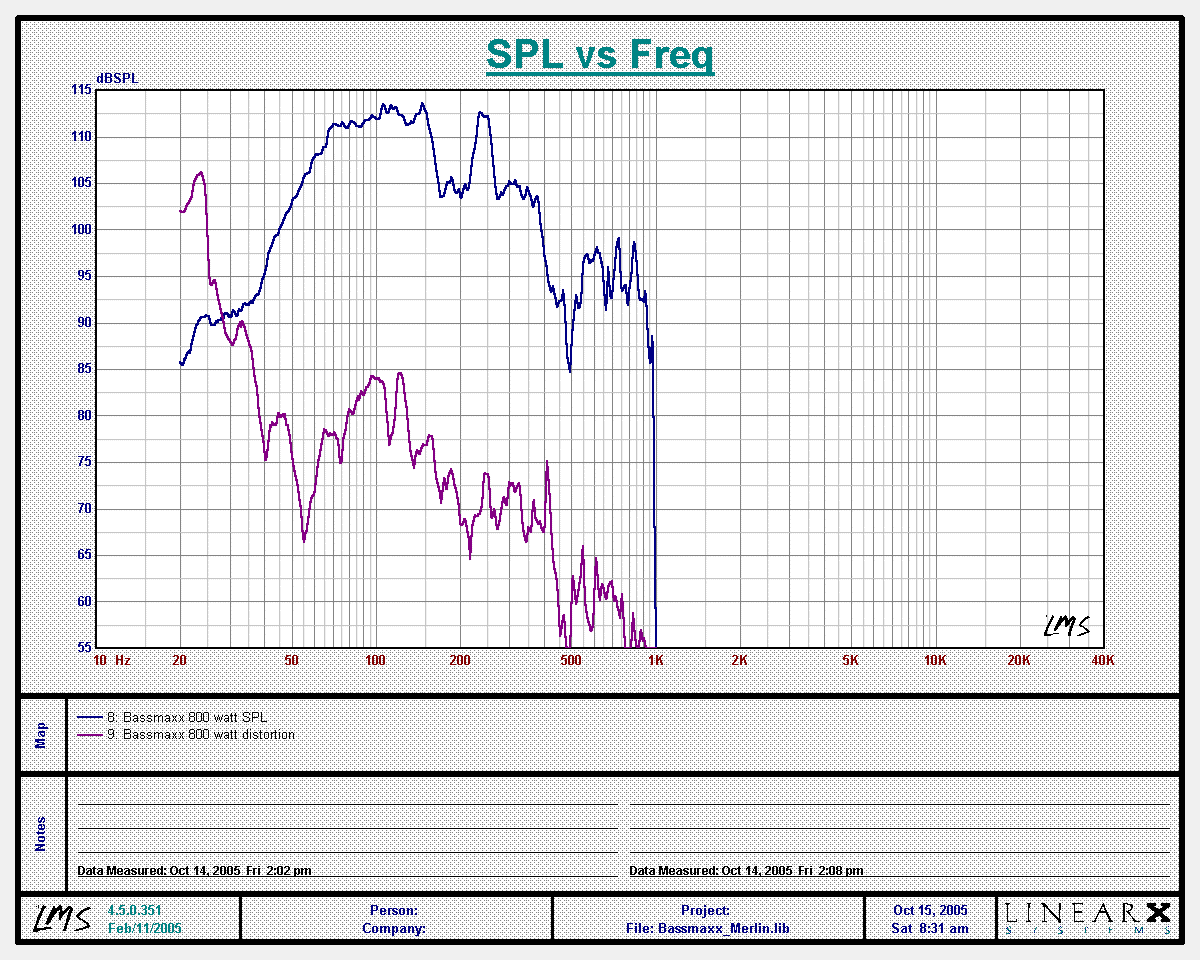 Bassmaxx response at 10 meters with 80v (800w) input
Bassmaxx response at 10 meters with 80v (800w) input
Output at 800 watts measured at 10 meters is about 112dB average between 70Hz and 150Hz, which is 132db at 1 meter.
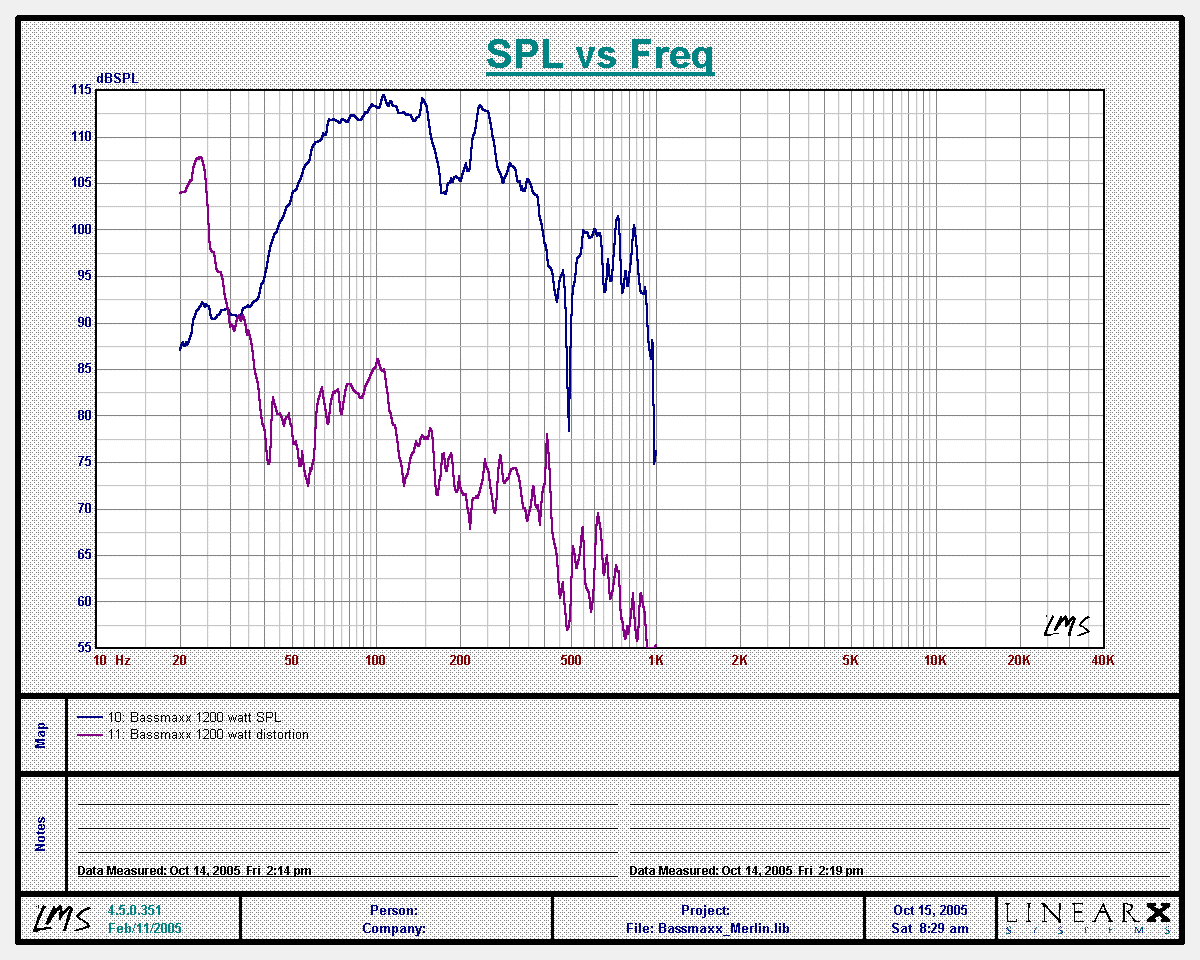 Bassmaxx response at 10 meters with 98v (1200w) input
Bassmaxx response at 10 meters with 98v (1200w) input
Output at 1200 watts measured at 10 meters is about 113dB average between 70Hz and 150Hz, which is 133db at 1 meter.
|
|
|
|
| Re: Hornsub shootout RESULTS - Tuba 24 [message #28081 is a reply to message #28078] |
Sat, 15 October 2005 13:20   |
 |
 Wayne Parham
Wayne Parham
Messages: 18985
Registered: January 2001
|
Illuminati (33rd Degree) |
|
|
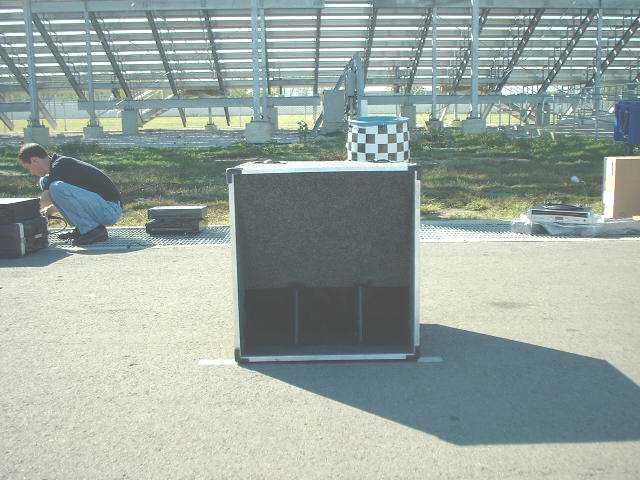 Tuba 24 basshorn sub
Tuba 24 basshorn sub
The Tuba 24 was the first to be tested. It weighs in at about 65 lbs and measures 24" x 24" x 24". It uses a single Eminence HL10A, although this one has a prototype HL10C driver. The difference is the C model is 4 ohms and has a smaller 0.75" cooling vent. Other than that, performance appears to be identical.
Specifications:
Weight: 65lbs
Dimensions: 24" x 24" x 24"
Power handling: 300wrms
Impedance: 6Ω or 12Ω (depending on driver)
Frequency range: 40Hz - 200Hz
Sensitivity: 102dB/W/M
Max Output: 128dB/M
Distortion at 100 watts: 5%
First, we measured impedance and found Zmin to be 6.0Ω. So 24.5v is required for 100 watts, 34.6v for 200 watts, 49v for 400 watts and 60v for 600 watts.
Next, we measured output at 28.28v. This is a little more than 100 watts. Since we measured 10 meters away, the values correspond to 2.83v/1M.
[align=center]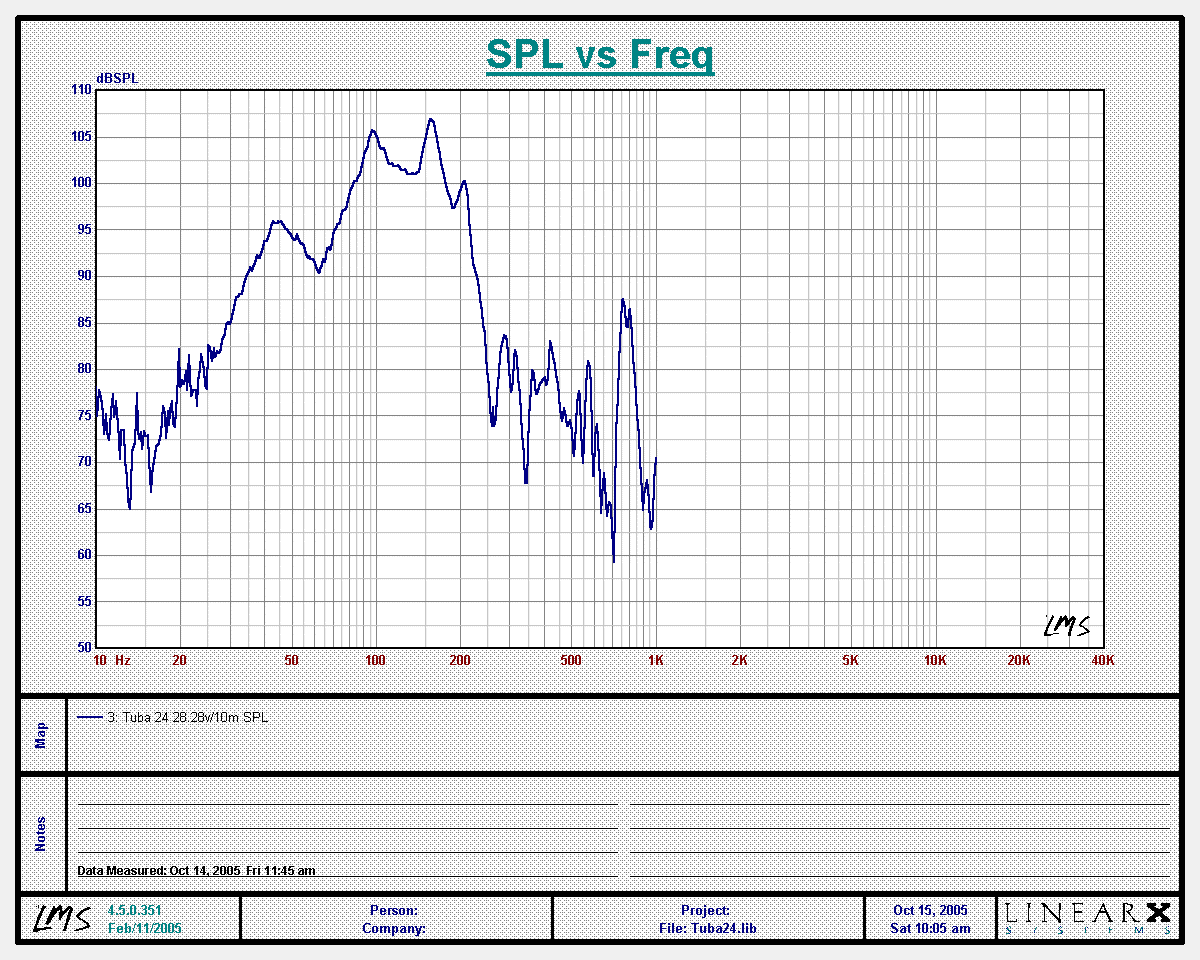
[b]Tuba 24 response at 10 meters with 28.28v input (2.83v/1M)
From this, we perform an inverse FFT to obtain impulse and step response:
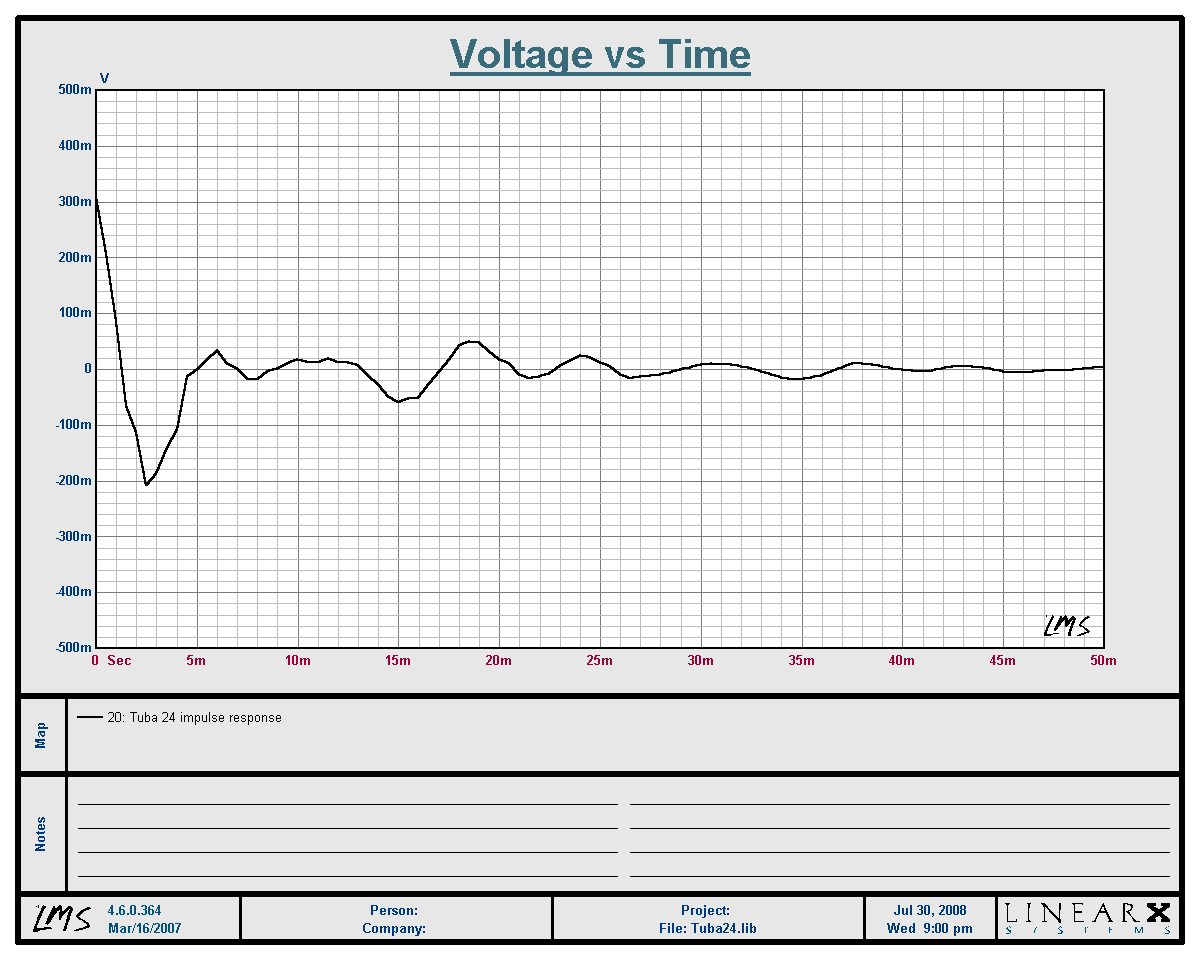 Tuba 24 Impulse Response
Tuba 24 Impulse Response
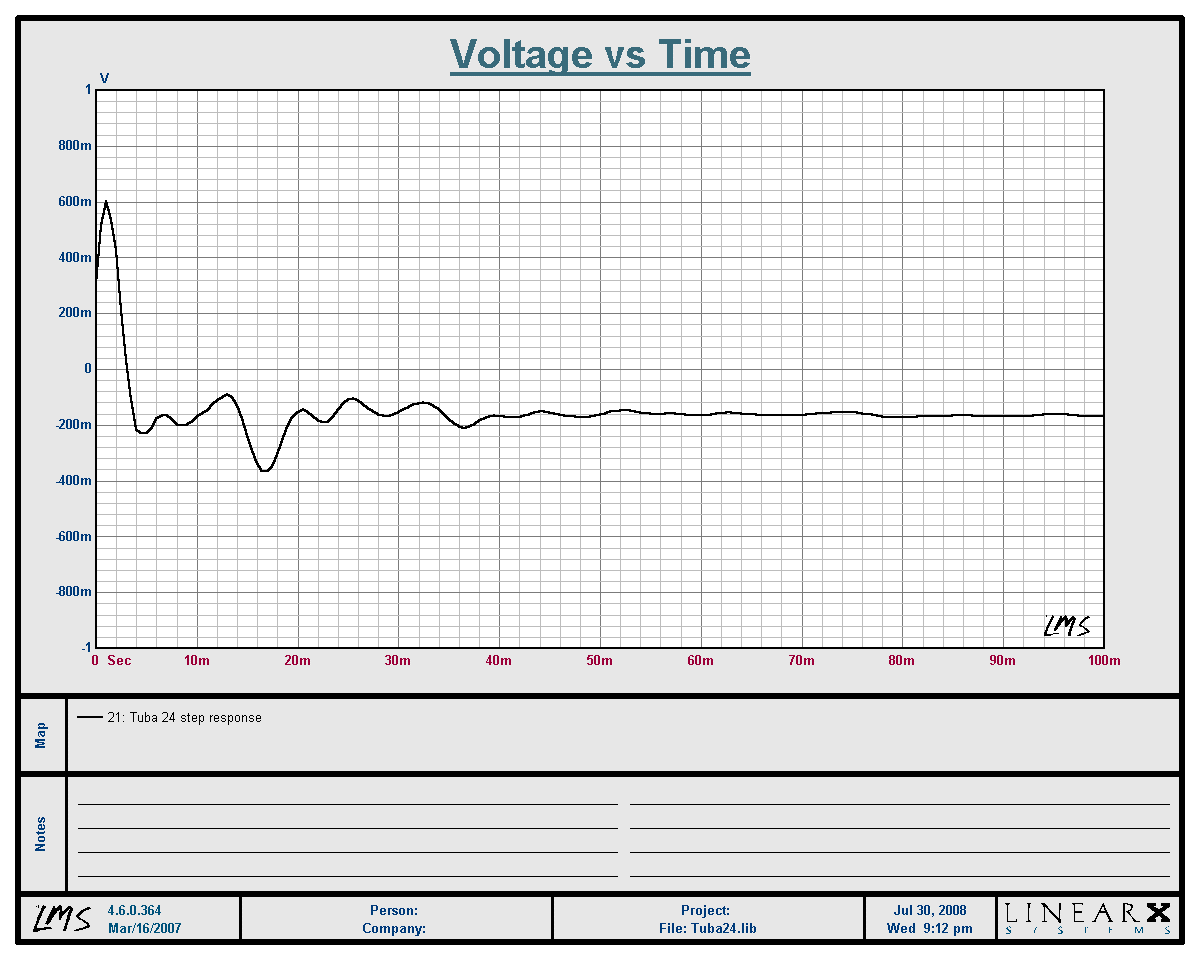 Tuba 24 Step Response
Tuba 24 Step Response
Measurement at 100 watts:
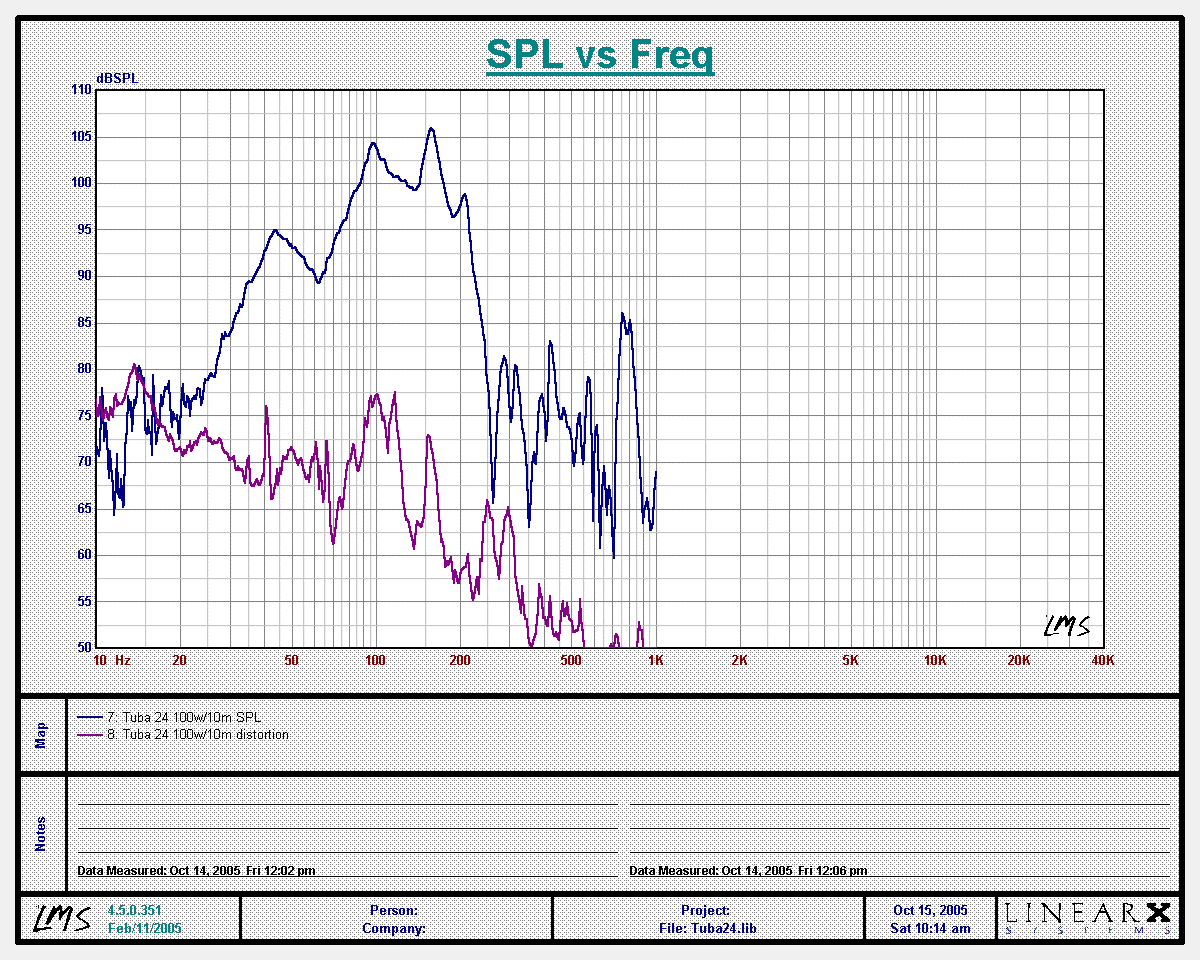 Tuba 24 response at 10 meters with 24.5v (100w) input (1W/1M)
Tuba 24 response at 10 meters with 24.5v (100w) input (1W/1M)
The blue line is SPL, and the violet line shows distortion. Average distortion is 25dB under the fundamental, which is about 5%. Since measurement was taken at 10 meters, add 20dB to find SPL at 1 meter. With 100 watts input, the 10 meter measurement works out the same as 1 watt input measured at a distance of 1 meter.
Measurement at 200 watts:
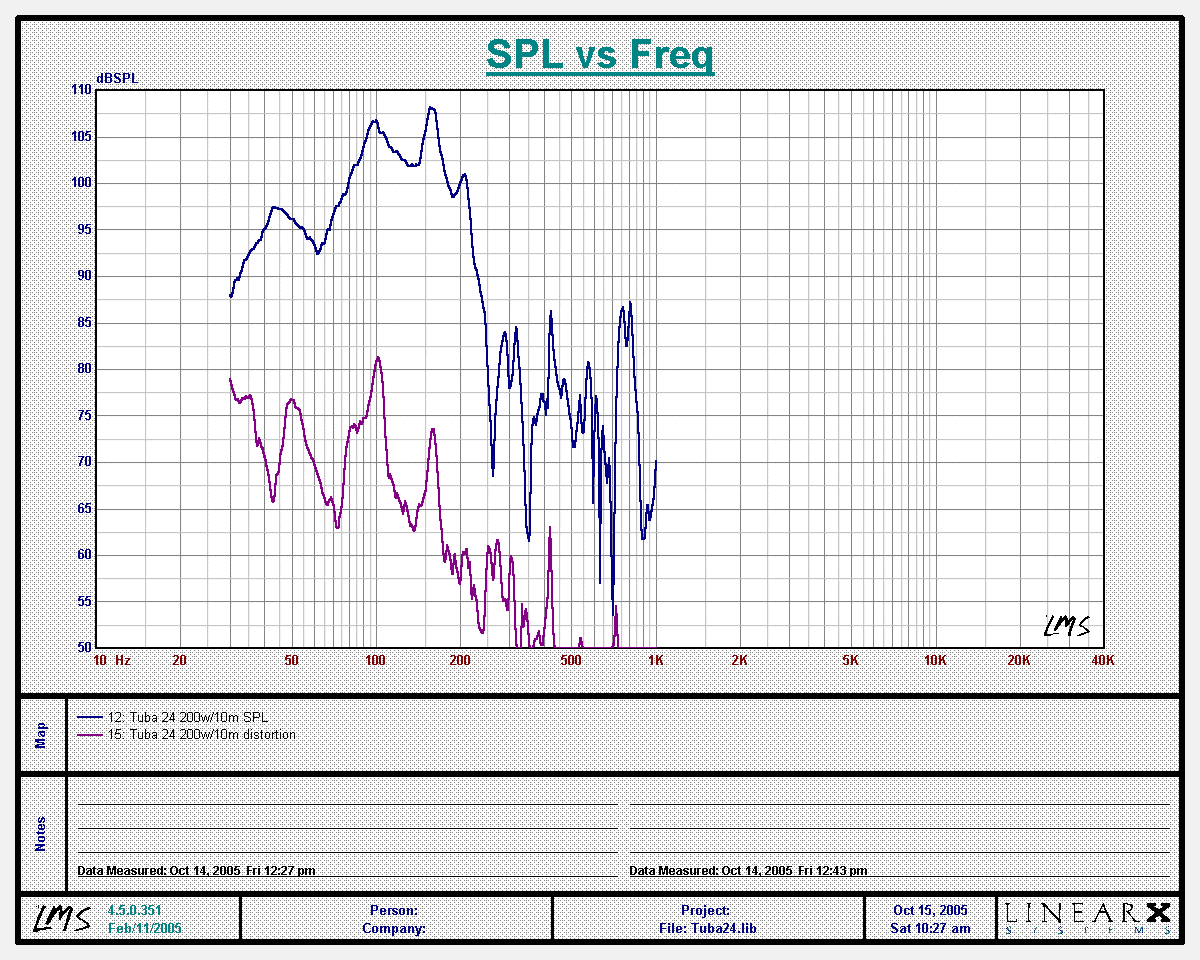 Tuba 24 response at 10 meters with 34.6v (200w) input
Tuba 24 response at 10 meters with 34.6v (200w) input
Output at 200 watts measured at 10 meters is about 105dB average between 70Hz and 170Hz, which is 125db at 1 meter.
Measurement at 400 watts:
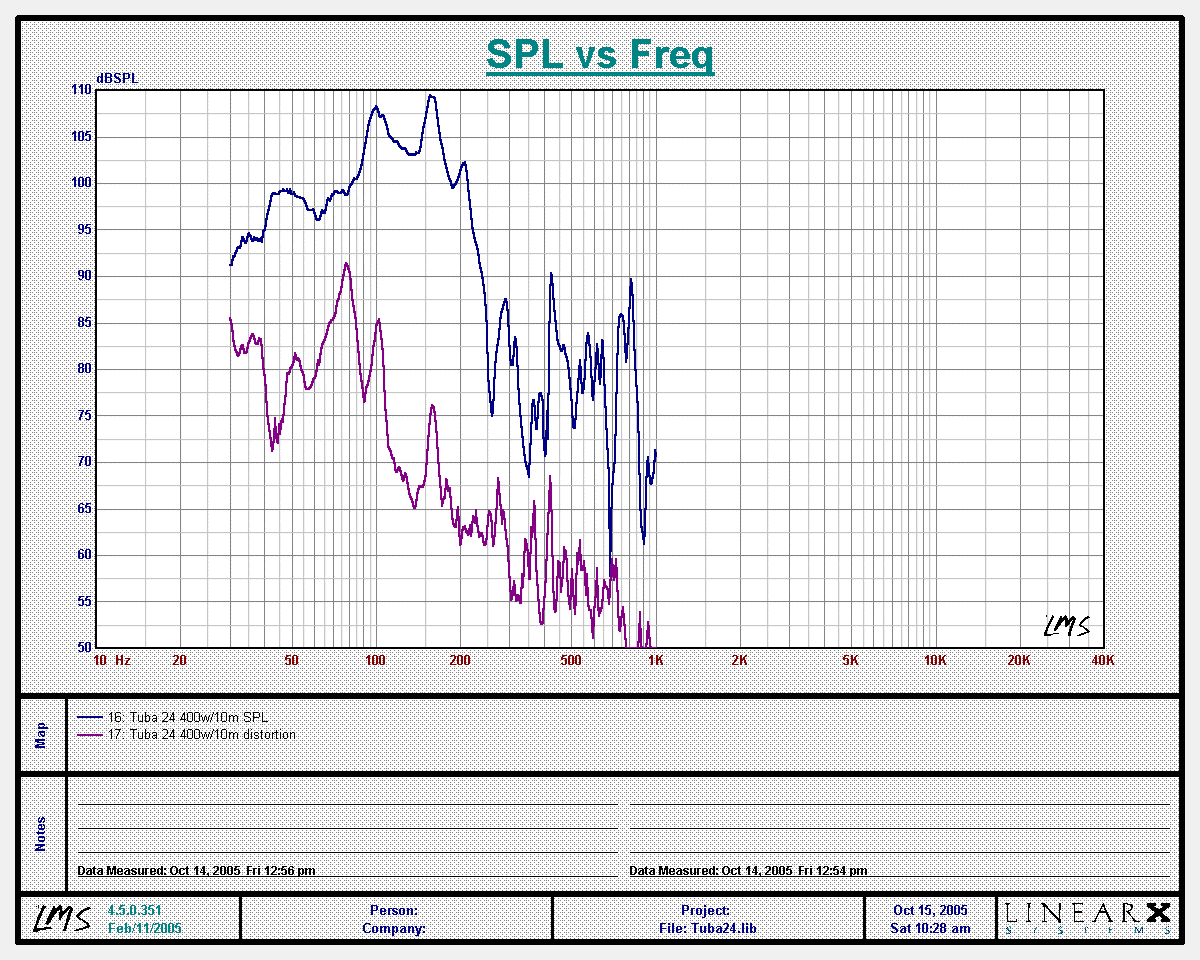 Tuba 24 response at 10 meters with 49v (400w) input
Tuba 24 response at 10 meters with 49v (400w) input
Output at 400 watts measured at 10 meters is about 108dB average between 70Hz and 170Hz, which is 128db at 1 meter.
Measurement at 600 watts:
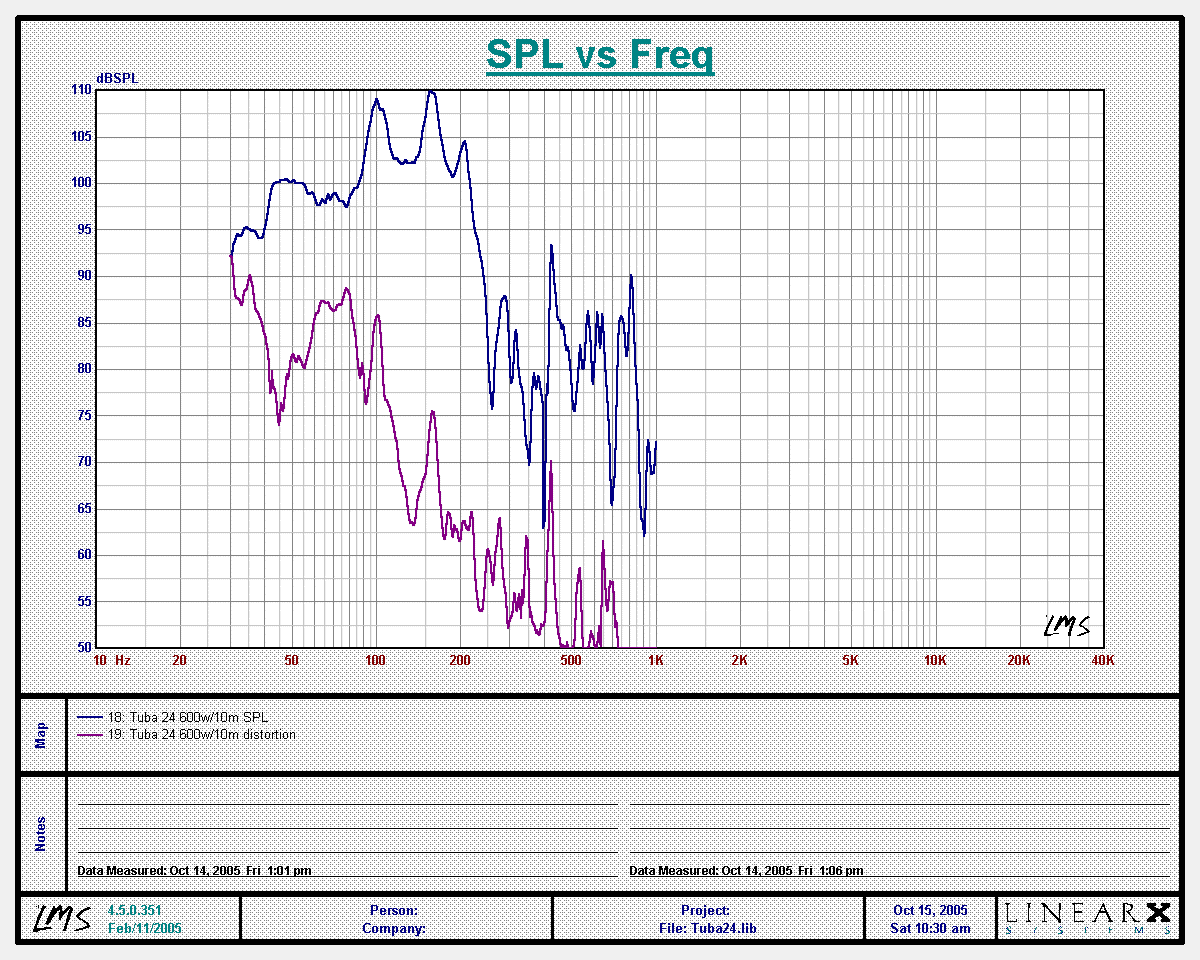 Tuba 24 response at 10 meters with 60v (600w) input
Tuba 24 response at 10 meters with 60v (600w) input
Increasing power from 400 watts to 600 watts results in little increased acoustic output.
|
|
|
|
|
|
| Re: Hornsub shootout RESULTS - DR250 [message #28083 is a reply to message #28082] |
Sat, 15 October 2005 18:48   |
 Leland Crooks
Leland Crooks
Messages: 212
Registered: May 2009
|
Master |
|
|
|
I really regret that we didn't get a chance to play some music through these. They are an amazing speaker. I know David was skeptical of the piezos, which is everyone's first response. The second response when they hear them is Wow. Maybe next time. I'll have the new piezo 14 tweeter array in them by then. Thanks Wayne, it was fun and informative. I think it was shown that a guy with a tablesaw can compete. After all, that's where the majors came from originally.
|
|
|
|
|
|
|
|
|
|
| My impressions [message #28087 is a reply to message #28078] |
Sun, 16 October 2005 13:14   |
 akhilesh
akhilesh
Messages: 1275
Registered: May 2009
|
Illuminati (3rd Degree) |
|
|
|
I attended for about 2 hours. I got a chance to hear the 12 Pi and Leland Crooks' tuba. I was very impressed! The main benefits of the 12 Pi are awesome SPL, and very low distortion. Wayne & Bill Wassilak pushed it to 2400 Watts! The combination of pushpull drivers and heat exchanger seem to create an awesome combination in terms of max SPL and very low distortion. I thnk we are talking less than 3 percent at 140 db levels, but check the graphs out for yourself. It was also the biggest box. Wayne mentioned it can be run indefinitely at 1600 Watts because of the heat exchanger. The tuba was smaller, very small, and seems very good for gigs in rooms/halls that can accomodate 100 or so people. Leland's system was the winner in terms of portability. I did not hear David Lee's bass max, but from what I heard others say, it had a very flat curve from about 50 hz to 150 hz. I did not get a chance to see the distortion numbers on it. It seemed capable of pretty high SPLs also, in the 130-140 range, at 1 meter. But I may be mistaken on that number (it may be more or less). The graphs may tell the story in thse other posts. Overall, it was the middle in terms of size, and seemed to be a very solid all round performer. It was awesome to hear these huge sound transducers in an open field. Amazing! Great experience. Plus all the cool equipment brought by David Lee was cool, esp the 9000 Watt QSC amp that was the main testing power amp, plus the LMS software. IT was cool to see realtime graphing of distortion & SPL! Very nice set up, and great event! The exact antithesis of the 2 watt SET mindset!
-akhilesh
|
|
|
|
|
|
Goto Forum:
Current Time: Sat Dec 20 03:34:04 CST 2025
|







